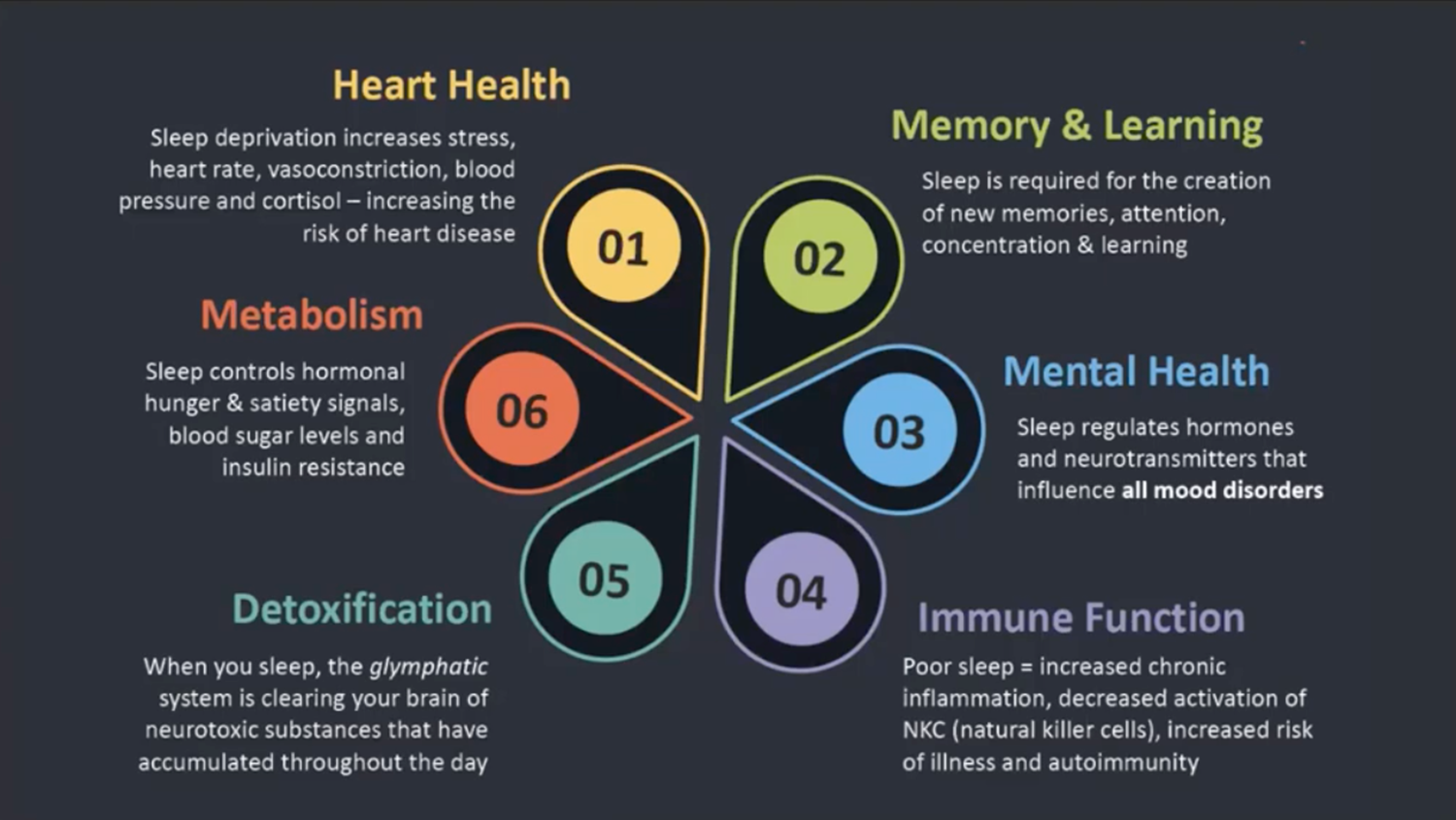Sleep better, Work better - The recipe for workplace wellbeing
Starting Health and Wellbeing week with a calm and restful bang, Daniel White from Daniel White Health took to the virtual stage to explain the link between a good nights sleep and a productive day at work. If you would like to watch this webinar in full, please scroll to the bottom of this article.
Without enough sleep your brain and body's systems won’t function normally, those day to day tasks at work slowly become harder to complete and taking on new information feels impossible. To put it bluntly, your body needs sleep just as it needs air and food to function at its best. During sleep, your body heals itself and restores its chemical balance allowing your brain to forge new thought connections and boost memory retention. That colleagues email address that just keeps slipping through your memory? Could be those late night Netflix episodes impacting your sleep that are to blame.
In a world of glowing blue screens it can feel difficult to switch off, and in fact, these screens can really throw off your body's natural circadian rhythm causing you to not get the full potential of a good nights sleep.

Slide from 'Sleep better, work better' webinar
What on earth is a circadian rhythm?
Circadian rhythms exist all around us, in animals, plants and even microbes. They help flowers bloom at the right time and let animals know when it's day or night and what time of year it is so they can fill their role in nature. The term circadian comes from the Latin phrase, “circa diem,” which means “around a day” these rhythms work by making sure that the body’s processes are optimised at various points during a 24-hour period.
In people, circadian rhythms coordinate mental and physical systems throughout the body. For example, the digestive system produces proteins to match the timing of meals, and the endocrine system (the messenger system of the body) regulates hormones to match energy expenditure.
The circadian rhythms throughout the body are connected to a master clock, (expanded upon in Daniel's webinar below) located in the brain. Specifically, it is found in the suprachiasmatic nucleus (SCN), in a part of the brain called the hypothalamus. The SCN is very sensitive to light changes, and for this reason circadian rhythms are closely connected to day and night. While exercise, social activity, and temperature, can also affect the master clock, light is the most powerful influence on circadian rhythms.
So how does all this affect your working day?
Employees may want to be their best at all hours, but their natural circadian rhythms will not always align with this desire and as we ride the rise and fall of our peak hours, usually higher around midday and 6pm we will ultimately crash around the low 3pm energy lull. Tailoring your workday around your energy source could be the boost to productivity your team is looking for, tackling the more mundane tasks when your energy is lowest and doing your more creative work at your peaks.
However we have to take in consideration the larks and owls of our teams, early rising larks may be more productive working an earlier shift while owls may benefit more from the 6pm peak and get more done later in the evening. It falls to managers to be aware of these energy wanes and be more forgiving of those who may be more exhausted, but it falls to us, the workers to give ourselves the good night rest we truly need.
Top Tips for a better nights sleep
- Stick to a regular sleep schedule, by going to bed at the same time each night and getting up at the same time each morning, including on the weekends your body will begin to regulate your melatonin better.
- Open those curtains and absorb that natural light! Especially earlier in the day, this light will send a signal to your brain helping you wake up better. If you can, try going for a morning or lunchtime walk.
- Make sure you get enough physical activity during the day, but try not to exercise within a few hours of bedtime. Your body needs time to wind down to rest.
- Avoid artificial light within a few hours of bedtime. Use a blue light filter on your computer or smartphone, or go the next step and purchase some blue light filter glasses.
- Since your body will primarily use the nighttime to heal your body after you've digested your dinner try not to eat anything or drink in excess within a few hours of bedtime; avoid alcohol and foods high in fat or sugar in particular as these can be particularly disruptive to your nights sleep.
- Keep your bedroom cool, dark, and quiet. No flashing fairy lights or 'white noise' music (sorry!) while these nice calming bedroom habits are great for the wind down portion of your evening these ultimately can disrupt your sleep meaning its not as fitful even if you get your full 8 hours! Try a 'cooling' pillow and duvet set to help curb those heat fluctuations through the year.
- If you are struggling to sleep, don't lie in bed getting more frustrated at yourself! Get up and move into a different room and try reading a book until you feel more tired, then go back to bed.


